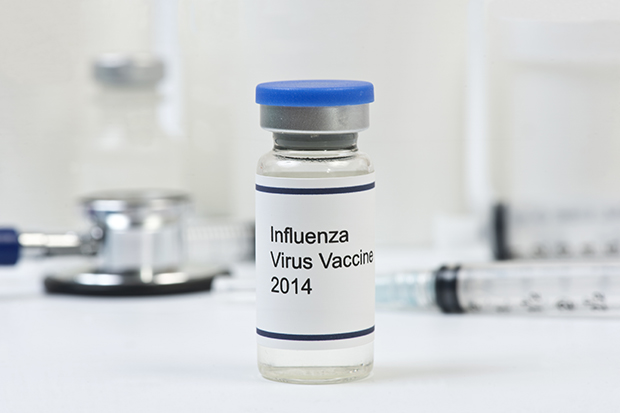
By Jean Bellisario, RN, BSN, Director Infectious Disease, Peoria City/County Health Department
Yourself!
Influenza, also known as the flu, is a contagious respiratory illness. Fever, cough, sore throat, runny nose, headaches, tiredness, and muscle and body aches are all flu symptoms. The flu is different from a cold, and flu symptoms normally appear quite suddenly. While most people recover in a few days to weeks, there can be a long range of complications which last longer. Who has the time for that? Having the flu means missed work, school, or medical expenses, as well as feeling bad. Each flu season even healthy people can contract the flu and have a serious illness. The flu can also make any chronic conditions worse, such as triggering asthma attacks or worsening heart conditions. There have also been some deaths associated with the flu. While it’s true that no vaccine is 100 percent effective, in most years the vaccine’s match to the circulating viruses is a good match. Even with a partial match, a new study in the Journal of Clinical Infectious Diseases indicated what we have heard for years — that people who received the flu shot and still got the flu had less severe disease and fewer complications than those who didn’t get the flu shot. So be proactive, stay healthy, and get your flu shot for you.
Your family and friends!
Flu season generally runs from early October, peaking between December and March, and can last into May. During this time, holiday gatherings and many other special occasions occur. Bringing the flu into these occasions can be dangerous for family members. Very young children, particularly under age five, and older adults, as well as those with chronic health conditions, have a high risk for complications from the flu. The Centers for Disease Control and Prevention (CDC) reports that in the last flu season, 101 pediatric deaths in the United States were associated with the flu. A recent CDC study shows that flu-associated deaths could be reduced by about half in children with underlying high risk medical conditions and by nearly two thirds among otherwise healthy children just by getting flu vaccinations. Pregnant women are also at greater risks for complications from the flu, so a flu vaccination is recommended and has proven safe for mom and baby. So, protect your family and friends. Be proactive, stay healthy, and get your flu shot — and encourage family and friends to get their flu shots, too.
Your co-workers and customers!
So we’ve all heard it — you should stay home when you’re sick. In reality, this doesn’t always happen, but going to work with the flu can easily spread it to others, with additional costs in medical bills and missed workdays. The flu costs the United States more than $87 billion dollars annually and is responsible for 17 million missed workdays each year. If you work in customer service, food service, daycares, schools, a medical setting, or any place you have contact with people, be aware that getting the flu can affect many others. So, don’t miss work or take illness into your workplace. Be proactive, stay healthy, and get your flu shot — and encourage your co-workers to do the same.
When is the best time to get your flu shot?
Now, of course! To be ready for the peak flu-season months, the best time for your flu shot is early in the season, usually by November, before the flu is active in our community. It will take a couple of weeks for your body to respond to your flu shot and offer the best protection from the flu. If you miss getting your flu vaccine early, you can still get one any time during the season when flu viruses are circulating, but remember that getting an early vaccine also provides that early protection.
Where can you get your flu shot this season?
To help prevent the spread of flu in the workplace, many employers now offer flu shots for employees, so take advantage of that opportunity. Don’t have this offered at your workplace? Flu shots are also available throughout our community at medical provider offices, clinics, pharmacies, health departments, and other locations. Flu shots are covered by most insurance plans. The flu shot can’t give you the flu, but not getting a flu shot can! So, be proactive, stay healthy, and get your flu shot.
Learn more about the benefits of public health policies and programs at www.pcchd.org — Peoria City/County Health Department, a nationally accredited public health department.
